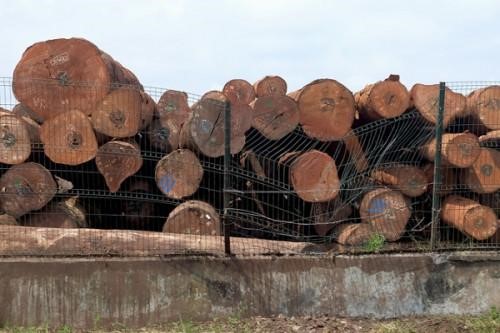Cameroon’s Forestry Felling Tax Drops By $20M In Two Years

Cameroon registered a drop of 10 billion FCFA (about US$20 million) in forestry felling tax within the past two years, National Programme for the Security of Forestry Revenue said.
Sixty-eight forestry exploitation companies operating in Cameroon present a risk of “non-payment of forestry felling tax”, and at least 29 others among them do not have a taxpayers’ identification number, National Programme for the Security of Forestry Revenue, a structure of the Ministry of Finance revealed.
It estimated that the country experienced a shortfall of 10 billion FCFA in 2018 and 2019 due to these companies which have a propensity for not paying the forestry felling tax.
The forestry felling tax which is paid or retained at source by clients purchasing log timber and deposited at the treasury of the National Programme for the Security of Forestry Revenue or at the division of big enterprises at the General Directorate of Taxes, represents four per cent of the free on board (FOB) of felled logs.
In June this year, the Timber Sector Grouping of Cameroon made an appeal to the Cameroonian authorities for a reduction of this tax to the level at which it stood in 2018 which was 2.5 per cent of the free on board (FOB) value of felled logs.
In support of their appeal, the forestry exploiters cited the ravages on the sector caused by the coronavirus pandemic.
While the government is yet to give a precise answer to the prayers of the forestry enterprises, the ordinary Cameroonian is of the opinion that rather than reduce a franc from the taxes the timber companies pay, they should rather be taxed to pay more.
“They, the timber companies, hardly respect the clauses of their obligations stipulated in the timber license agreements concerning royalties not only to the government but also to the local communities whose forests they destroy with reckless abandon in gross disrespect of the environmental norms,” Goddy Belomo, an environmental activist told HumAngle.
Belomo said the companies often renege on their promises to the communities.
“They most times agree to provide social amenities such as rural roads, drinking water, health facilities, the construction of schools etc.”
“But once they receive the licences, they forget all these social aspects of their obligations and concentrate only on making their money.”
He noted that the Government should ensure that the money they save by not meeting these obligations is added to their taxes.
“Let them not be given any further incentives by way of reduced taxes of any kind”, in the economic capital.”
Support Our Journalism
There are millions of ordinary people affected by conflict in Africa whose stories are missing in the mainstream media. HumAngle is determined to tell those challenging and under-reported stories, hoping that the people impacted by these conflicts will find the safety and security they deserve.
To ensure that we continue to provide public service coverage, we have a small favour to ask you. We want you to be part of our journalistic endeavour by contributing a token to us.
Your donation will further promote a robust, free, and independent media.
Donate HereStay Closer To The Stories That Matter




